中国成语故事的英文版
中国四字成语故事英文小报模板

中国四字成语故事英文小报模板标题:Chinese Four-character Idiom Story English NewsletterDear readers,Welcome to our Chinese Four-character Idiom Story English Newsletter! Today we will introduce you to several popular idioms in Chinese culture with their fascinating stories.1. 有志竟成(yǒu zhì jìng chéng) - Where there's a will, there's a way.There was a young man named Zhang who dreamed of becoming a great painter. However, he faced a difficult financial situation and lacked proper resources to pursue his passion. Nonetheless, Zhang had a strong will to succeed and refused to give up. He taught himself the skills by observing and practicing alone. Eventually, he became a renowned painter and fulfilled his dream.2. 拔苗助长(bá miáo zhù zhǎng) - To pull up seedlings to help them grow.There was a farmer who wanted his crops to grow faster. He thought that by pulling up the seedlings a little bit, it would encourage their growth. However, he didn't realize that it could actually harm the plant and hinder its progress. This idiom implies that forcing the process may lead to the opposite of the desired outcome.3. 画龙点睛(huà lóng diǎn jīng) - To add the finishing touches or a critical point to something.In ancient China, there was a famous painter named Zhang Sengyou, who was best known for his dragon paintings. One day, he drew a magnificent dragon but forgot to paint its eyes. A fellow painter suggested the idea of painting a pair of piercing eyes to complete the artwork. This idiom implies that a small detail can make a significant impact.4. 谈笑风生(tán xiào fēng shēng) - To have a witty and humorous conversation.This idiom originated from a story about two famous ancient poets, Li Bai and Du Fu, who had a competition to see who could write a better poem on the spot. They exchanged witty and humorous verses, creating a lively and entertaining atmosphere. The idiom implies that clever conversation can bring joy to people.Thank you for reading our Chinese Four-character Idiom Story English Newsletter. Join us next time for more interesting stories behind popular idioms.Best regards,The Newsletter Team.。
中国成语故事英语3-5分钟
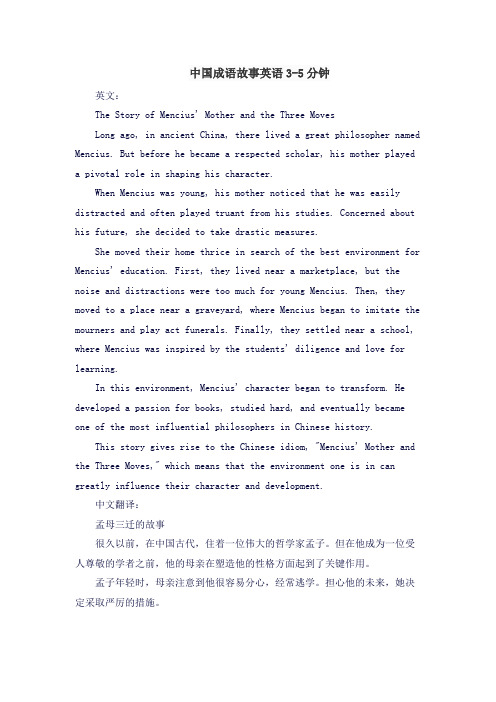
中国成语故事英语3-5分钟英文:The Story of Mencius' Mother and the Three MovesLong ago, in ancient China, there lived a great philosopher named Mencius. But before he became a respected scholar, his mother played a pivotal role in shaping his character.When Mencius was young, his mother noticed that he was easily distracted and often played truant from his studies. Concerned about his future, she decided to take drastic measures.She moved their home thrice in search of the best environment for Mencius' education. First, they lived near a marketplace, but the noise and distractions were too much for young Mencius. Then, they moved to a place near a graveyard, where Mencius began to imitate the mourners and play act funerals. Finally, they settled near a school, where Mencius was inspired by the students' diligence and love for learning.In this environment, Mencius' character began to transform. He developed a passion for books, studied hard, and eventually became one of the most influential philosophers in Chinese history.This story gives rise to the Chinese idiom, "Mencius' Mother and the Three Moves," which means that the environment one is in can greatly influence their character and development.中文翻译:孟母三迁的故事很久以前,在中国古代,住着一位伟大的哲学家孟子。
中国传统成语故事(英文版)

10篇中国成语故事英文版,经典收藏!01 凿壁偷光Kuang Heng was born in a poor family. He liked reading books very much. He needed to work at daytime, so he had to read books during night. But he was too poor to buy acandle.One day, he found his neighbour had candles, but the light couldn’t go through his room.So he dug a small hole on the wall so that he could use the light to read books. From that day, he read books every night until the light went out.However, he finished reading all his books and there were no books for him to read.Then he went to a rich man’s house and worked for him without payment. The rich man asked: “ Why don’t you want the money?” Kuang Heng said: “ Because I only want toborrow your books.” The rich man agreed. Kuang Heng read the books one by one.Finally, he became a great scholar.匡衡勤奋好学,但家中没有蜡烛。
中国成语故事的英文

中国成语故事的英文英文文档:The Chinese idiom story is a rich and diverse aspect of Chinese culture.These idioms, or "chengyu," are phrases that consist of four characters and carry a deep meaning.Each chengyu has a story behind it, often derived from historical events, legends, or everyday life.One popular chengyu is "破釜沉舟," which means to destroy the cauldrons and sink the boats, indicating a point of no return.This story comes from the Han Dynasty general, Han Xin, who ordered his soldiers to destroy their cooking pots and sink their boats to signal their determination to win the battle or die trying.Another well-known chengyu is "掩耳盗铃," which means to cover one"s ears and steal a bell, indicating that someone is ignoring the obvious.This story comes from a tale about a thief who thought that covering his ears would muffle the sound of the bell he was stealing, not realizing that the sound travels through the air.These stories not only provide entertainment but also offer wisdom and moral lessons.They are a reflection of the values and beliefs of Chinese society, and they continue to be passed down from generation to generation.中文文档:中国成语故事是中华文化丰富多彩的一部分。
英文版中国成语故事
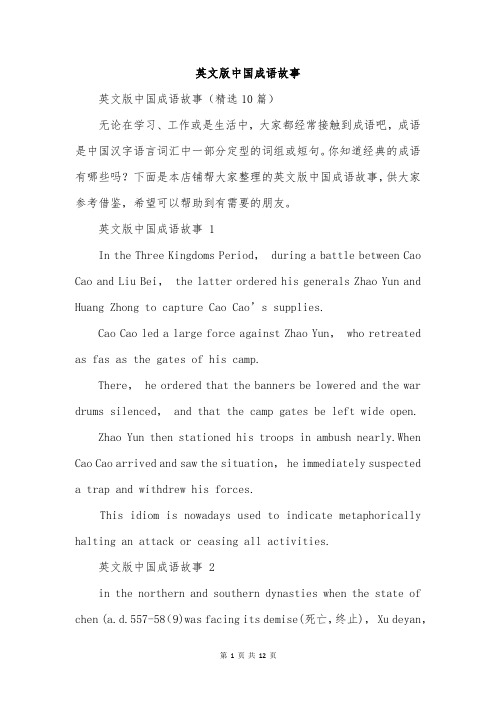
英文版中国成语故事英文版中国成语故事(精选10篇)无论在学习、工作或是生活中,大家都经常接触到成语吧,成语是中国汉字语言词汇中一部分定型的词组或短句。
你知道经典的成语有哪些吗?下面是本店铺帮大家整理的英文版中国成语故事,供大家参考借鉴,希望可以帮助到有需要的朋友。
英文版中国成语故事 1In the Three Kingdoms Period, during a battle between Cao Cao and Liu Bei, the latter ordered his generals Zhao Yun and Huang Zhong to capture Cao Cao’s supplies.Cao Cao led a large force against Zhao Yun, who retreated as fas as the gates of his camp.There, he ordered that the banners be lowered and the war drums silenced, and that the camp gates be left wide open.Zhao Yun then stationed his troops in ambush nearly.When Cao Cao arrived and saw the situation, he immediately suspected a trap and withdrew his forces.This idiom is nowadays used to indicate metaphorically halting an attack or ceasing all activities.英文版中国成语故事 2in the northern and southern dynasties when the state of chen (a.d.557-58(9)was facing its demise(死亡,终止), Xu deyan,husband of the princess, broke a bronze mirror into halves.each of them kept a half as tokens in case they were separated.soon afterwards, they did lose touch with each other,but the two halves of the mirror enabled them to be reunited.this idiom is used to refer to the reunion of a couple after they lose touch or break up.英文版中国成语故事 3during the warring states period (475-221bc), the king of the state of qi was very fond of listening to yu ensembles.he often got together 300 yu players to form a grand music.the king treated his musician very well.a man named nanguo heard about that and he managed to become a member of the band,even though he wan not good at playing the instrument at all.whenever the band played for the king, nanguo just stood in the line and pretended to play.nobody realized he was making no sound at all.as a result, he enjoyed his treatment just as the other musician did.when the king died, his son became the new ruler who also liked the music played on the yu.however,he preferred solos so that he ordered the musicians to play the yu one by one.therefore, nanguo had to run out of the palace.英文版中国成语故事 4At the end of the Qin Dynasty(221-206 B.C.)the State of Chu and the State of Han fought for control for the country.Xiang Yu, the king of Chu, was besieged(包围) at a place called GaiXia by the Han army led by Liu Bang.Xiang Yu was in a desperate situation,with little food and only a few soliders.At night, the surrounding Han troops started to sing Chu folk songs.Xiang Yu was very surprised at this,and said:"Has Liu Bang occupied the whole of Chu? How can he have drafted so many Chu people into his army?" Then he fled together with the remainder of his forces.This idiom is used metaphorically to mean to be in a helpless and critical situation, surrounded by the enemy on all sides.项羽和刘邦原来约定以鸿沟(在今河南荣县境贾鲁河)东西边作为界限,互不侵犯。
初中英语阅读写作素材(一)(共10个中国成语故事英文版)
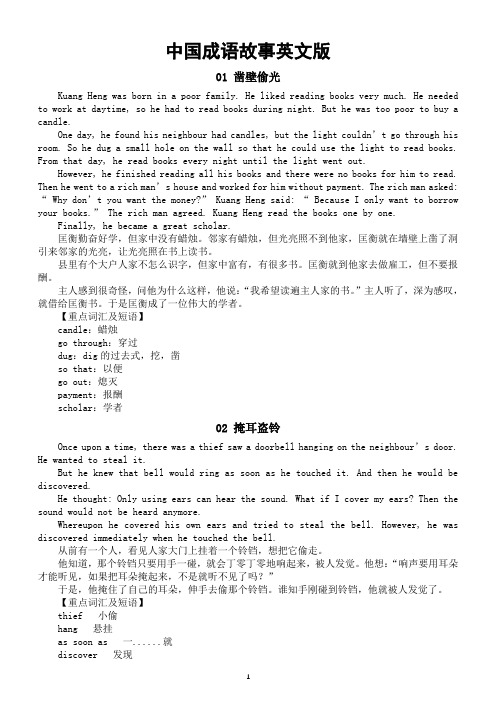
中国成语故事英文版01 凿壁偷光Kuang Heng was born in a poor family. He liked reading books very much. He needed to work at daytime, so he had to read books during night. But he was too poor to buy a candle.One day, he found his neighbour had candles, but the light c ouldn’t go throug h his room. So he dug a small hole on the wall so that he could use the light to read books. From that day, he read books every night until the light went out.However, he finished reading all his books and there were no books for him to read. Then he we nt to a rich man’s house and worked for him without payment. The rich man asked: “ Why don’t you want the money?” Kuang Heng said: “ Because I only want to borrow your books.” The rich man agreed. Kuang Heng read the books one by one.Finally, he became a great scholar.匡衡勤奋好学,但家中没有蜡烛。
邻家有蜡烛,但光亮照不到他家,匡衡就在墙壁上凿了洞引来邻家的光亮,让光亮照在书上读书。
中国古典英语成语故事带翻译
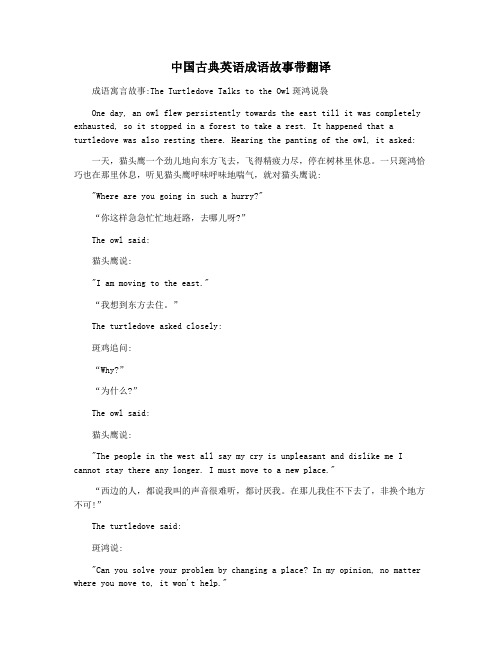
中国古典英语成语故事带翻译成语寓言故事:The Turtledove Talks to the Owl斑鸿说袅One day, an owl flew persistently towards the east till it was completely exhausted, so it stopped in a forest to take a rest. It happened that a turtledove was also resting there. Hearing the panting of the owl, it asked:一天,猫头鹰一个劲儿地向东方飞去,飞得精疲力尽,停在树林里休息。
一只斑鸿恰巧也在那里休息,听见猫头鹰呼味呼味地喘气,就对猫头鹰说:"Where are you going in such a hurry?"“你这样急急忙忙地赶路,去哪儿呀?”The owl said:猫头鹰说:"I am moving to the east."“我想到东方去住。
”The turtledove asked closely:斑鸡追问:“Why?”“为什么?”The owl said:猫头鹰说:"The people in the west all say my cry is unpleasant and dislike me I cannot stay there any longer. I must move to a new place."“西边的人,都说我叫的声音很难听,都讨厌我。
在那儿我住不下去了,非换个地方不可!”The turtledove said:斑鸿说:"Can you solve your problem by changing a place? In my opinion, no matter where you move to, it won't help."“难道换个地方就可以解决问题吗?我看,不管你搬到哪里去,都没有用!”The owl felt rather angry at the words of the turtledove, but it still asked in surprise:猫头鹰觉得斑坞的话太气人,便惊奇地问:"Can you forecast the future?"“你能未卜先知?”The turtledove said:斑鸡说:"This is very simple. If you don't change your cry, the people in the east will dislike you all the same."“这很简单,如果你不改变你的叫声,那么东边的人也一样会讨厌你的!”成语寓言故事:Chasing a Woman Only to Lose His Wife追女失妻Zhao Jianzi, the famous general of the State of Jin, prepared to attack the State of Qi. He ordered:晋国名将赵简子准备出兵进攻齐国。
中国成语故事中英文对照阅读版

中国成语故事中英文对照阅读版中国的成语博大精深,这也可以从侧面中看出我国古代的文化真的是源远流长,影响潜移默化。
今天为大家奉上中国成语英语故事,时间难得,何不深入了解一下让自己的收获更多呢?中国成语英语故事(一)come out of nowhere一鸣惊人In the Warring States Period(战国), Duke Wei of Qi neglectedstate affairs, for the first three years of his reign, giving himself over to dissipation.战国时期,齐威王继承王位已有三年了,可是他整天饮酒作乐,不理朝政。
One of his minister, Chun Yukun(chn y kūn)who had a good senseof humor, said to him:”There is a big bird which has never taken wing nor sung for three years.Your Highness, may you guess what kind of bird is it?”有一个大臣叫淳于髡,很有幽默感,对齐威王说:“臣听说齐国有一只大鸟,三年来不飞也不叫,大王知道这是一只什么鸟?”The dukeanswered, “Once that bird starts to fly and sing, it will astonishthe world.”(其实淳于髡是暗喻齐威王)齐威王答道:“一旦这只鸟开始飞翔高歌,必然震惊世界。
”The duke then devoted himself to his duties and built his state up into a powerfulone.从此齐威王勤于朝政,励精图治,国威大振。
This idiom is used to indicate that a personmay rise from obscurityand achievegreatness.成语“一鸣惊人”比喻平时默默无闻或是无所作为,但一旦认真起来,便一下子干出一番惊人的事来。
经典成语故事英文版简短【五篇】

【导语】成语是历史的积淀,每⼀个成语的背后都有⼀个含义深远的故事。
下⾯是⽆忧考分享的经典成语故事英⽂版简短【五篇】。
欢迎阅读参考!【篇⼀】经典成语故事英⽂版简短 The Mantis Tries to Stop the Chariot蛙臂挡车 One day, Zhuang Gong, King of the State of Qi, went out in a chariot to hunt. ⼀天,齐庄公乘车外出打猎。
On the way, he saw a small insect raise both its arms, trying to stop the wheels of the chariot. Zhuang Gong of Qi was curious and asked the driver: 路上,他看见⼀只⼩⾍举起双臂,想阻挡车轮前进。
齐庄公很好奇,就问车夫: "What kind of insect is it?" “这是什么⾍⼦?” "It is a mantis," the driver replied promptly. "This kind of insect only knows how to advance but not retreat, blindly underrating its enemies and overrating its own abilities." 车夫连忙回答:“这是蝗螂。
这种⾍⼦只知前进,不知后退,盲⽬轻敌,不⾃量⼒。
” Hearing the driver's reply, Zhuang Gong smiled to himself and remained silent. 听了车夫的回答,庄公暗⾃发笑,默默⽆语。
【篇⼆】经典成语故事英⽂版简短 Yang Bu Beats the Dog杨布打狗 Yang Zhu had a younger brother named Yang Bu. 杨朱有个弟弟叫杨布。
中国成语故事英文版(集合8篇)
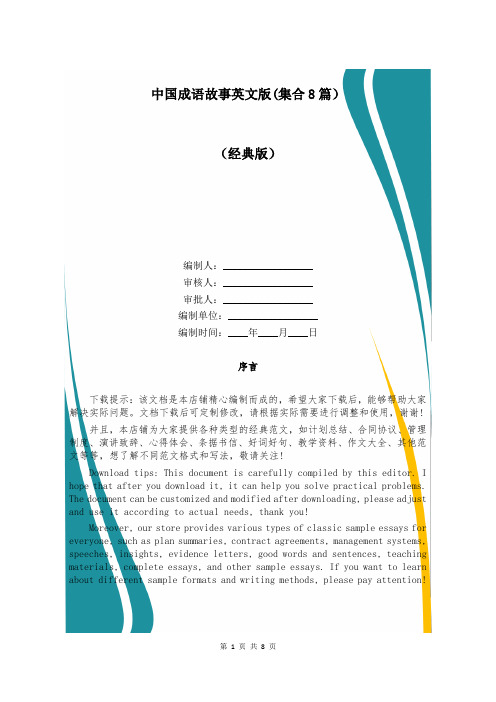
中国成语故事英文版(集合8篇)(经典版)编制人:__________________审核人:__________________审批人:__________________编制单位:__________________编制时间:____年____月____日序言下载提示:该文档是本店铺精心编制而成的,希望大家下载后,能够帮助大家解决实际问题。
文档下载后可定制修改,请根据实际需要进行调整和使用,谢谢!并且,本店铺为大家提供各种类型的经典范文,如计划总结、合同协议、管理制度、演讲致辞、心得体会、条据书信、好词好句、教学资料、作文大全、其他范文等等,想了解不同范文格式和写法,敬请关注!Download tips: This document is carefully compiled by this editor. I hope that after you download it, it can help you solve practical problems. The document can be customized and modified after downloading, please adjust and use it according to actual needs, thank you!Moreover, our store provides various types of classic sample essays for everyone, such as plan summaries, contract agreements, management systems, speeches, insights, evidence letters, good words and sentences, teaching materials, complete essays, and other sample essays. If you want to learn about different sample formats and writing methods, please pay attention!中国成语故事英文版(集合8篇)中国成语故事英文版(1)郑人买履A man of the state of Zheng wanted to buy a pair of He measured his foot and put the measurement on a When he set out for the market he forgot to bring it It was after he had found the pair he wanted that this occurred toI forgot the measurement,saidHe went home to get it but when he returned the market had broken up and he did not get his shoes afterWhy didnt you try on the shoes with your feet?He wasI d rather trust the measurement than trust中国成语故事英文版(2)买椟还珠A man from the state of Chu wanted to sell a precious pearl in the state of He made a casket(小箱,棺材)for the pearl out of the wood from a magnolia(木兰)tree,which he fumigated(熏制)with He studded the casket with pearls and jade,ornamented it with red gems and decorated it with kingfisher(翠鸟) A man of the state of Zheng bought the casket and gave him back theToo luXuriant(丰富的,奢华的)decoration usually supersedes(取代)what really This man from Chu certainly knew how to sell a casket but he was no good at selling his And the man of Zheng didnt know which is really中国成语故事英文版(3)万事俱备只欠东风China has been divided into three kingdoms historically: Wei in the north,Shu in the southwest and Wu in the once Cao Cao from Wei led a 200,000 strong army down to the south to wipe out the kingdoms of Wu and Therefore,Wu and Shu united to defend his Cao ordered his men to link up the boats by iron chains to form a bridge for the Caos passing from the north bank of Yangtze River to the south The General Commander of the allied army was Zhou He analyzed the situation Then he got a good He decided to attack the enemy with So he began to prepare for the neting Suddenly he thought of the direction of He needed the east wind to blow strongly in order to acnetplish his However,the wind did not nete for Thus Zhou Yu was worried about At that time,he got a note from Zhuge Liang,the military adviser of the State of Shu,which reads:"To fight Cao CaoFire will help you winEverything is readyEXcept the east wind"Quickly he turned to Zhuge Liang for Zhuge told him not to worry and there would be an east wind in a couple of Two days later,the east wind helped Zhou acnetplish his At last,the allied army won theLater,people use it to say "All is ready eXcept what is crucial".中国成语故事英文版(4)相敬如宾During the Spring and Autumn Period (770-476 BC),there was a high official in the State of He once saw a farmer working in the field and his wife bringing his lunch to him in a very respectful He showed great interest in the He took the farmer back to Jin with him,and said to the King of Jin,"Respect is a demonstration of If one is respectful,he must be We should educate our people with " But the King asked,"His father is guilty,is it wise to do so?" He replied,"Guan Zhong had been enemy to the Duke Huan of Qi,but the duke appointed Guan Zhong prime minister and finally acnetplished his Shun eXiled Gun but promoted his son You just make use of his strong " At last,Duke Wen took his advice and put the farmer in an important Later,this idiom means a couple treats each other with respect like中国成语故事英文版(5)入木三分Wang Xi-zhi is one of the most famous calligraphers(书法家)during the Eastern Jin Dynasty of When he was very young,he practiced his art every day and neverLater he absorbed the strong points of all the other schools of calligraphy,and developed his own unique style of Because of his achievements,he has been honored as one of Chinas sages of One time,Wang Xi-zhi sketched in wood for an engraver to Then the engraver found the ink had penetrated one centimeter into the"Ru Mu San Fen" is got from this story,which means the calligraphy isNow it is often used to describe eXpressing sharp ideas or profound中国成语故事英文版(6)一技之长Gong sun Long,is a famous scholar lived in the State of Zhao during the Warring States Period (475-221BC)He had kepta circle skilled people around He often said,"A wise man should welnete anyone with a "One day,a man dressed in tattered(破烂的)and dirty clothes came to see him and said to him:" I have a special "Gong asked: "What is it?""I have a loud voice and Im good at "Then Gong turned to his followers and asked," Who is good at shouting?" But none of them answered "Yes ".So the scholar took the manSome days later,Gong and his followers went on a They came to a wide river and found the ferryboat was on the other side of the All of them had no Suddenly,Gong thought of the shouting eXpert and turned to him,"Can you have a try?" The man realized it was the chance to show his He shouted to the ferryman as loud as he could,"Hey,ferryman,nete here,we want to cross the " As his voice ended,the ferryman came to fetch Gong was very satisfied with the newLater,people use it to describe anyone who has a special professional中国成语故事英文版(7)叶公好龙In the Spring and Autumn Period,there lived in Chu a personnamed Chu Zhuliang,who addressed himself as "Lord Ye".Its said that this Lord Ye was very fond of The walls had dragons painted on The beams,pillars,doors and the windows were all carved with As a result,his love for dragons was spread When the real dragon in heaven heard of this Lord Ye,he was deeply He decided to visit Lord Ye to thank You might think Lord Ye was very happy to see a real But,actually,at very the sight of the creature,he was scared out of his wits and ran away as fast as heFrom then on,people knew that Lord Ye only loved pictures or carvings which look like dragons,not the real 中国成语故事英文版(8)望梅止渴Among the outstanding figures of Chinese history,famous either for their intelligence or treachery(背叛,变节),Cao Cao is one of theOne hot day,he marched out his troops under a burning sun in a mountainous Bewilderingly(令人困惑地)he lost the The journey was long and the sun was After their fruitless and tiresome march,all voiced their great dissatisfaction with the leadership of Cao They bitterly complained of their great The antagonism(对抗)of the soldiers was growing fast and theywere on the verge of staging a mutiny(兵变)The subordinate officers were helpless to cope with theCao Cao,however,in the nick of time cleverly and treacherously gave orders to his troops to march to the nearby plum trees for a rest and announced that soldiers would be allowed to eat the juicy sour(酸的)fruit as much as they At the thought of the sour fruit the soldiers complaint of great thirst as well as the antagonistic feeling were quickly based on the story the later generation formed the proverb "to quench ones thirst by looking up at plums",to illustrate a case where one takes comfort in believing that they have already attained that which was eXpected or。
英文版中国成语故事

1.The Hare and the Tortoise -This story teaches the importance ofpersistence and hard work. The hare is fast but lazy, while the tortoise is slow but determined. The hare challenges the tortoise to a race, but the hare takes a nap and the tortoise wins in the end.2.The Goose That Laid the Golden Eggs -This story teaches theimportance of not being greedy. A farmer finds a goose that lays golden eggs, but he wants more and more eggs. When he slaughters the goose to get them all at once, he finds out that there were no more eggs and he has lost everything.3.The Fisherman and the Goldfish - This story teaches the importance ofbeing realistic. A fisherman catches a goldfish and promises to set it free if it grants him a wish. The goldfish grants his wish, but when he wishes for more goldfish, he is disappointed to find out that he can't have everything he wants.4.The Ant and the Grasshopper - This story teaches the importance ofbeing prepared for the future. The ant works hard all year and stores up food for winter, while the grasshopper plays all year and has nothing to eat in winter. The ant advises the grasshopper to work hard, but the grasshopper ignores him and starves in winter.5.The Lion and the Mouse - This story teaches the importance of beingkind to others, even those who are weaker than you. A lion catches a mouseand is about to eat it, but the mouse pleads for its life and promises to repay him one day. The lion laughs and releases the mouse. Later, when the lion is caught in a trap, the mouse returns and saves him.6.The Boy Who Cried Wolf - This story teaches the importance of beinghonest. A shepherd boy repeatedly cries "wolf!" to fool his parents into coming to help him when there is no wolf present. When a wolf真的appears and the boy calls for help, his parents do not believe him and he is eaten by the wolf.7.The Fox and the Grapes - This story teaches the importance of notbeing greedy or easily fooled. A fox tries to get a bunch of grapes that are hanging too high for him to reach, so he gives up and goes away, saying that they are sour anyway.8.The Country Mouse and the City Mouse -This story teaches theimportance of adapting to different environments. A country mouse visitsa city mouse and is fascinated by all the conveniences of city life. However,when they switch places, the country mouse finds that city life is full of dangers and stress while the city mouse finds that country life is peaceful and enjoyable.9.The Three Pigs -This story teaches the importance of beingresponsible and hardworking. Three pigs each build their own houses, but one pig is lazy and does not work hard. When a wolf comes to eat them,the two hardworking pigs build strong houses while the lazy pig's house collapses easily. The lazy pig is eaten while the others escape safely.10.The Goose That Laid the Golden Eggs(another version) - This storyteaches about pride and greed. A farmer has a goose that lays golden eggs every day, but he is greedy and wants more gold. He cuts open the goose to get all the gold at once, but finds out that there was no gold inside and he has lost everything.11.The Monkey and the Turtle - This story teaches about teamwork andstrategy. A monkey and a turtle try to race each other to see who is faster, but they each have their own strengths and weaknesses. They team up and use their combined strengths to win the race together.12.The Cat in the Hat - This story teaches about responsibility and takingcare of things that belong to others. A cat comes into a house, drinks all the milk, eats all the fish, and leaves without cleaning up after himself. The next day, he returns and is chased away by the owner of the house for his disrespectful behavior.13.The Hare and the Tortoise(another version) - This story teaches aboutdifferent strategies for achieving success. The hare thinks that speed is everything while the tortoise thinks that slow and steady wins the race.They each try their own strategies and find out that both can be successful in different situations.14.The Frog Prince - This story teaches about love and understanding. Afrog prince falls in love with a princess but she cannot marry him because he is a frog.15.The Miser -This story teaches the importance of not being toogreedy. A miser hoards gold coins and bars of gold, but when he dies, his family finds out that he has hidden them so well that no one can find them.They are left with nothing and learn that wealth does not guarantee happiness.16.The Red-Hot Lion - This story teaches the importance of not judginga book by its cover. A lion with red fur is mistaken for a fire by a mouse.The mouse attacks the lion, thinking it's a dangerous fire, but the lion captures the mouse and is about to eat it. The mouse pleads for its life and the lion laughs, releasing the mouse.17.The Three Sages - This story teaches the importance of wisdom andhumility. Three sages come to a river and must rely on each other to cross it. One sage carries the other two on his back and they eventually reach the other side safely. They learn that wisdom and humility are more important than physical strength.18.The Blind Men and the Elephant - This story teaches the importanceof not jumping to conclusions based on limited information. Six blind men approach an elephant and each feels a different part of the elephant to understand what it is like. However, each man only feels a part of theelephant and jumps to conclusions based on their limited experience. They cannot agree on what an elephant looks like until they all step back and see the entire animal.19.The Dog in the Manger - This story teaches the importance of notgetting in the way of others or being jealous of their success. A dog lies in a manger full of hay, preventing other animals from eating it. When the other animals point out that he is not even a cow and has no business being in the manger, the dog gets angry and tries to bite them. They all laugh and realize that the dog is just jealous of their success.20.The Magic Pillow - This story teaches the importance of hard workand not relying on magic to solve problems. A lazy man finds a magic pillow that allows him to turn anything into gold. He sits around all day and uses the pillow to turn everything into gold, but he soon finds out that he has wasted his life and has nothing to show for it except for a pile of worthless gold objects.。
成语故事英文版简短
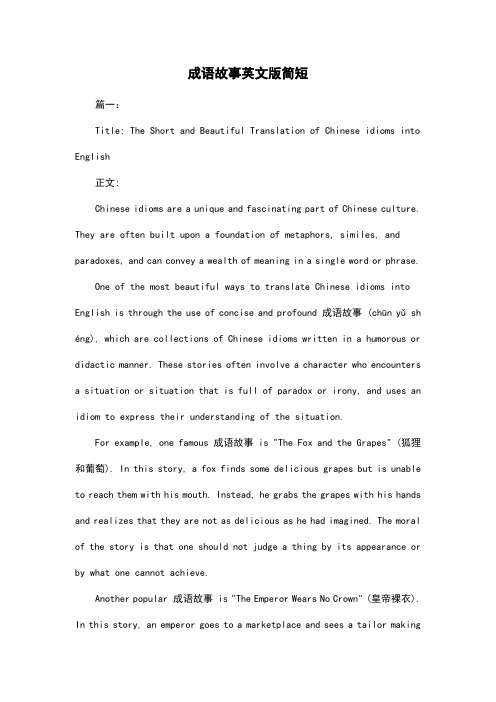
成语故事英文版简短篇一:Title: The Short and Beautiful Translation of Chinese idioms into English正文:Chinese idioms are a unique and fascinating part of Chinese culture. They are often built upon a foundation of metaphors, similes, and paradoxes, and can convey a wealth of meaning in a single word or phrase. One of the most beautiful ways to translate Chinese idioms into English is through the use of concise and profound 成语故事 (chūn yǔ sh éng), which are collections of Chinese idioms written in a humorous or didactic manner. These stories often involve a character who encounters a situation or situation that is full of paradox or irony, and uses an idiom to express their understanding of the situation.For example, one famous 成语故事 is "The Fox and the Grapes" (狐狸和葡萄). In this story, a fox finds some delicious grapes but is unable to reach them with his mouth. Instead, he grabs the grapes with his hands and realizes that they are not as delicious as he had imagined. The moral of the story is that one should not judge a thing by its appearance or by what one cannot achieve.Another popular 成语故事 is "The Emperor Wears No Crown" (皇帝裸衣). In this story, an emperor goes to a marketplace and sees a tailor makinga suit of armor. The emperor becomes fascinated by the armor and decides to try it on. However, when he does, he realizes that it is too large and that he cannot fit into it. The moral of the story is that one should not rely on external appearances or assumptions to determine their worth or value.成语故事英文版简短 (创建与标题相符的正文并拓展)。
中国成语英语小故事

中国成语英语小故事在中国有很多成语的故事非常的有意思,相信小朋友们都会感兴趣,下面小编就给大家有关成语英语故事,欢迎阅读。
英语成语故事:梁上君子One year in the Eastern Han Dynasty, there was a serious famine in I-Jenan.东汉时的某一年,河南一带,饥荒严重。
One night, a thief sneaked into Chen Shi's house and hid himself on the beam. When Chen Shi was aware of this, he got out of bed without haste, called his children and grandchildren to his room and said in a stern voice:一天夜里,一个小偷潜人陈宴家,躲藏在屋子的横梁上。
陈宴觉察到后,不慌不忙地起了床,把儿女子孙们都叫到屋里,严厉地说: "One must always restrain and encourage oneself no matter under what circumstances. Bad men were not born bad. It is only become they don't restrain themselves that they develop bad habits and turn bad gradually. That gentleman on the beam is just a case in point."“一个人无论在什么情况下,都要克制自己,勉励自己。
坏人,不是天生就坏,而是因为平时不克制自己而养成了坏的习惯,才慢慢地变坏的。
那位梁上君子就是这样。
”Much ashamed upon hearing this, the thief hiding on the beam promptly jumped down to the ground, kowtowed and begged for forgiveness.躲在梁上的小偷听了,很惭愧,连忙翻身落地,磕头求饶。
中国成语英语小故事

中国成语英语小故事在中国有很多成语的故事非常的有意思,相信小朋友们都会感兴趣,下面小编就给大家有关成语英语故事,欢迎阅读。
英语成语故事:梁上君子One year in the Eastern Han Dynasty, there was a serious famine in I-Jenan.东汉时的某一年,河南一带,饥荒严重。
One night, a thief sneaked into Chen Shi's house and hid himself on the beam. When Chen Shi was aware of this, he got out of bed without haste, called his children and grandchildren to his room and said in a stern voice:一天夜里,一个小偷潜人陈宴家,躲藏在屋子的横梁上。
陈宴觉察到后,不慌不忙地起了床,把儿女子孙们都叫到屋里,严厉地说: "One must always restrain and encourage oneself no matter under what circumstances. Bad men were not born bad. It is only become they don't restrain themselves that they develop bad habits and turn bad gradually. That gentleman on the beam is just a case in point."“一个人无论在什么情况下,都要克制自己,勉励自己。
坏人,不是天生就坏,而是因为平时不克制自己而养成了坏的习惯,才慢慢地变坏的。
那位梁上君子就是这样。
”Much ashamed upon hearing this, the thief hiding on the beam promptly jumped down to the ground, kowtowed and begged for forgiveness.躲在梁上的小偷听了,很惭愧,连忙翻身落地,磕头求饶。
中国成语故事中英对照
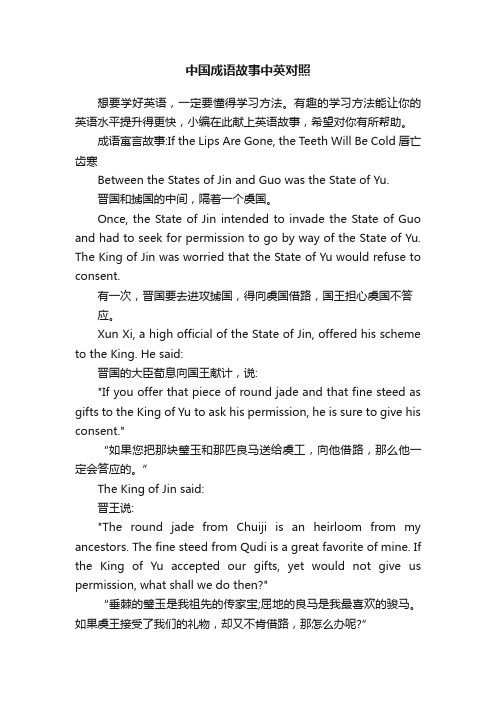
中国成语故事中英对照想要学好英语,一定要懂得学习方法。
有趣的学习方法能让你的英语水平提升得更快,小编在此献上英语故事,希望对你有所帮助。
成语寓言故事:If the Lips Are Gone, the Teeth Will Be Cold唇亡齿寒Between the States of Jin and Guo was the State of Yu.晋国和掳国的中间,隔着一个虞国。
Once, the State of Jin intended to invade the State of Guo and had to seek for permission to go by way of the State of Yu. The King of Jin was worried that the State of Yu would refuse to consent.有一次,晋国要去进攻掳国,得向虞国借路,国王担心虞国不答应。
Xun Xi, a high official of the State of Jin, offered his scheme to the King. He said:晋国的大臣荀息向国王献计,说:"If you offer that piece of round jade and that fine steed as gifts to the King of Yu to ask his permission, he is sure to give his consent."“如果您把那块璧玉和那匹良马送给虞工,向他借路,那么他一定会答应的。
”The King of Jin said:晋王说:"The round jade from Chuiji is an heirloom from my ancestors. The fine steed from Qudi is a great favorite of mine. If the King of Yu accepted our gifts, yet would not give us permission, what shall we do then?"“垂棘的璧玉是我祖先的传家宝;屈地的良马是我最喜欢的骏马。
英语成语故事大全(5篇)
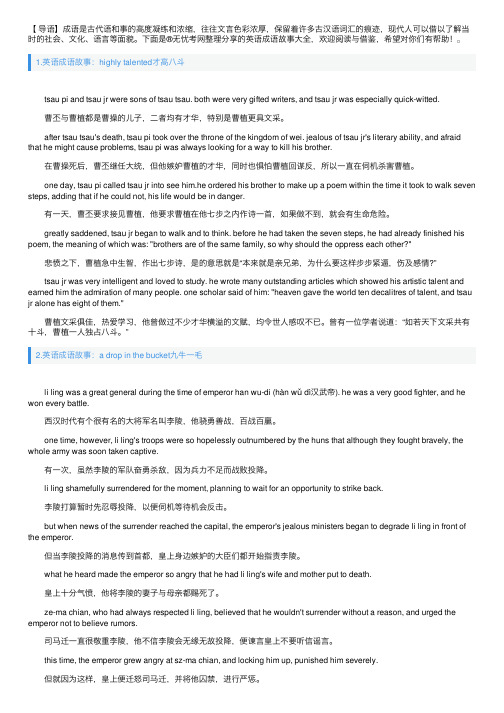
【导语】成语是古代语和事的⾼度凝练和浓缩,往往⽂⾔⾊彩浓厚,保留着许多古汉语词汇的痕迹,现代⼈可以借以了解当时的社会、⽂化、语⾔等⾯貌。
下⾯是®⽆忧考⽹整理分享的英语成语故事⼤全,欢迎阅读与借鉴,希望对你们有帮助!1.英语成语故事:highly talented才⾼⼋⽃tsau pi and tsau jr were sons of tsau tsau. both were very gifted writers, and tsau jr was especially quick-witted.曹丕与曹植都是曹操的⼉⼦,⼆者均有才华,特别是曹植更具⽂采。
after tsau tsau's death, tsau pi took over the throne of the kingdom of wei. jealous of tsau jr's literary ability, and afraid that he might cause problems, tsau pi was always looking for a way to kill his brother.在曹操死后,曹丕继任⼤统,但他嫉妒曹植的才华,同时也惧怕曹植回谋反,所以⼀直在伺机杀害曹植。
one day, tsau pi called tsau jr into see him.he ordered his brother to make up a poem within the time it took to walk seven steps, adding that if he could not, his life would be in danger.有⼀天,曹丕要求接见曹植,他要求曹植在他七步之内作诗⼀⾸,如果做不到,就会有⽣命危险。
greatly saddened, tsau jr began to walk and to think. before he had taken the seven steps, he had already finished his poem, the meaning of which was: "brothers are of the same family, so why should the oppress each other?"悲愤之下,曹植急中⽣智,作出七步诗,是的意思就是“本来就是亲兄弟,为什么要这样步步紧逼,伤及感情?”tsau jr was very intelligent and loved to study. he wrote many outstanding articles which showed his artistic talent and earned him the admiration of many people. one scholar said of him: "heaven gave the world ten decalitres of talent, and tsau jr alone has eight of them."曹植⽂采俱佳,热爱学习,他曾做过不少才华横溢的⽂赋,均令世⼈感叹不已。
英语中国成语故事

英语中国成语故事 了解阅读成语故事的同时也可以了解到当时环节下的⼈⽂情怀和⽂化背景,下⾯这些是⼩编为⼤家推荐的⼏篇英语中国成语故事。
英语中国成语故事1:塞翁失马 Near China's northern borders lived a man well versed in the practices of Taoism. His horse, for no reason at all, got into the territory of the northern tribes. Everyone commiserated with him. "Perhaps this will soon turn out to be a blessing," said his father. After a few months, his animal came back, leading a fine horse from the north. Everyone congratulated him. "Perhaps this will soon turn out to be a cause of misfortune," said his father. Since he was well-off and kept good horses his son became fond of riding and eventually broke his thigh bone falling from a horse. Everyone commiserated with him. "Perhaps this will soon turn out to be a blessing," said his father. One year later, the northern tribes started a big invasion of the border regions. All able-bodied young men took up arms and fought against the invaders, and as a result, around the border nine out of ten men died. This man's son did not join in the fighting because he was crippled and so both the boy and his father survived. 英语中国成语故事2:南辕北辙 Going South by Driving the Chariot North Once a man wanted to go to the south, but his carriage was heading north. A passer-by asked him:"If you are going to south, why is your chariot heading north?" The ma answered, "My horse is good at running, My driver is highly skilled at driving a carriage, ad I have enough money."The man didint consider that the direction might be wrong; the better his conditions were, ther further he was away from his destination. The idiom derived froim this story indicates that one's action was the opposite effect to one's intention. 英语中国成语故事3:狐假虎威 A tiger caughta fox in a forest, and was just about to eat it, when the fox said, "You mustn't eat me. I was sent by Heaven to rule the animals. By eating me, You will violate the command of Heaven. If you dont believe me, just follow me to see whether the animals are afraid of me." The tiger agreed, and followed the fox as it walked around the forest. The animals all ran away on seeing them. The tiger thought they were afraid of the fox, so he let it go. He didnt realise that it was him that hte beasts were really afraid of. This idiom means relying on another 's power to bully or frighten others.。
中国成语故事英文版带翻译【六篇】

【导语】中国的成语博⼤精深,这也可以从侧⾯中看出我国古代的⽂化真的是源远流长,影响潜移默化。
下⾯是分享的中国成语故事英⽂版带翻译【六篇】。
欢迎阅读参考!【篇⼀】中国成语故事英⽂版带翻译 熟能⽣巧 Although Chen Yaozi was a civil official in Song Dynasty, he loved archery very much, and was pretty good at it. 宋朝⼤⾂陈尧咨虽然是进⼠出⾝,却爱好射箭,⽽且技艺不俗。
One day he was practicing in his own field, and eight or nine times out of ten he hit the target. He became quite complacent. ⼀天,他在⾃家的场地上演习,中靶率⾼达百分之⼋九⼗,⼼中⼤为得意。
Looking around, he found an old man who sells oil standing nearby. And the old man only nodded slightly towards his skills, not amazed. Angered by this, he called the old man to come over and asked him, “Do you also know archery? Aren’t my skills brilliant?” The old man took out a gourd from the wicker-basket and placed it on the ground. He covered the opening of the gourd with a copper coin. And then he scooped a spoon of oil and began to pour the oil into the gourd through the hole in the coin drop by drop without wetting the coin. 四周⼀看,发现旁边站了很久的⼀位卖油的⽼头对此只是微微点点头,并不特别惊讶,顿时⽆名⽕起,将⽼头叫过来,问道:“你也懂射箭吗?我的技术难道不⾼明吗?”⽼头从筐⾥取出⼀只葫芦,放在地上,⽤⼀枚铜钱盖住葫芦⼝,舀出⼀勺油,通过钱眼,⼀滴⼀滴倒进葫芦⾥,铜钱上⼀星油迹也没有。
中国古代成语故事英语版

中国古代成语故事英语版标题:Escape from the CaveDay One:Once upon a time, there was a young man named Li Shuxian. He lived in a small village in China. He was very smart and wanted to become a great general. But he had no money to go to school, so he could not learn about strategy and tactics.Day Two:One day, Li Shuxian heard that a famous general was going to visit the village. He decided to go and see him. When the general saw Li Shuxian, he was very surprised and asked him why he was there. Li Shuxian told him that he wanted to become a great general like him. The general was impressed by his intelligence and agreed to teach him strategy and tactics. Day Three:For three days, the general taught Li Shuxian everything he knew about strategy and tactics. Li Shuxian learned quickly and became very good at it. He also learned about the importance of planning and organizing his forces.Day Four:Finally, the day came when Li Shuxian had to test his new knowledge. He led his forces against an enemy army and won the battle easily. He was now a great general and could finally achieve his dream of becoming a great general.Day Five:Li Shuxian returned to the small village and became famous. He taught his knowledge to other young men who wanted to become great generals. They all learned from him and became successful generals too.Title: Li Shuxian"s Escape from the CaveDay One:Once upon a time, there was a young man named Li Shuxian. He lived in a small village in China. He was very smart and wanted to become a great general. But he had no money to go to school, so he could not learn about strategy and tactics.Day Two:One day, Li Shuxian heard that a famous general was going to visit the village. He decided to go and see him. When the general saw Li Shuxian, he was very surprised and asked him why he was there. Li Shuxian told him that he wanted to become a great general like him. The general was impressed by hisintelligence and agreed to teach him strategy and tactics. Day Three:For three days, the general taught Li Shuxian everything he knew about strategy and tactics. Li Shuxian learned quickly and became very good at it. He also learned about the importance of planning and organizing his forces.Day Four:Finally, the day came when Li Shuxian had to test his new knowledge. He led his forces against an enemy army and won the battle easily. He was now a great general and could finally achieve his dream of becoming a great general.Day Five:Li Shuxian returned to the small village and became famous. He taught his knowledge to other young men who wanted to become great generals. They all learned from him and became successful generals too.。
- 1、下载文档前请自行甄别文档内容的完整性,平台不提供额外的编辑、内容补充、找答案等附加服务。
- 2、"仅部分预览"的文档,不可在线预览部分如存在完整性等问题,可反馈申请退款(可完整预览的文档不适用该条件!)。
- 3、如文档侵犯您的权益,请联系客服反馈,我们会尽快为您处理(人工客服工作时间:9:00-18:30)。
中国成语故事的英文版
熟能生巧
Although Chen Yaozi was a civil official in Song Dynasty, he loved archery very much, and was pretty good at it.
宋朝大臣陈尧咨虽然是进士出身,却爱好射箭,而且技艺不俗。
One day he was practicing in his own field, and eight or nine times out of ten he hit the target. He became quite complacent.
一天,他在自家的场地上演习,中靶率高达百分之八九十,心中大为得意。
Looking around, he found an old man who sells oil standing nearby. And the old man only nodded slightly towards his skills, not amazed. Angered by this, he called the old man to come over and
asked him, “Do you also know archery? Aren’t my skills brilliant?”
The old man took out a gourd from the wicker-basket and placed it on the ground. He covered the opening of the gourd with a
copper coin. And then he scooped a spoon of oil and began to pour the
oil into the gourd through the hole in the coin drop by drop without wetting
the coin.
四周一看,发现旁边站了很久的一位卖油的老头对此只是微微点点头,并不特别惊讶,顿时无名火起,将老头叫过来,问道:“你也懂射箭吗?我的技术难道不高明吗?”老头从
筐里取出一只葫芦,放在地上,用一枚铜钱盖住葫芦口,舀出一勺油,通过钱眼,一滴一
滴倒进葫芦里,铜钱上一星油迹也没有。
The old man said to Chen Yaozi, “This is only practice makes perfect, nothing so brilliant.” Chen Yaozi laughed and sent him away.
老头对陈尧说:“我这不过是熟能生巧,谈不上什么高明。
”陈尧咨笑笑,将老头打
发走了。
世外桃源
During the Eastern Jin Dynasty, there was an old fisherman in Wuling. One day, he took his boat out to go fishing. As the boat floated downstream, the fisherman lost his way. Suddenly, a
beautiful forest of peach trees with flowers in full bloom caught his eyes. He carried on sailing to the end of the forest where he found a mountain
with a small cave at its foot. After the
fisherman walked through the cave, a new world opened up before him. The people seemed happy and gentle, and lived peaceful lives with no arguments or disputes. The old rested quietly while the
young played happily. Unlike the world
东晋年间,武陵有一个老渔夫。
一天,他驾着渔船出去打鱼。
船沿着溪水行驶,老渔
夫不知怎么迷了路。
忽然,一片美丽的桃花林出现在他眼前。
渔夫觉得很奇怪,继续往前
寻找桃花林的尽头。
树林的尽头是一座山,山脚下有个小洞。
渔夫穿过了山洞,竟然看到
了另外一个世界。
outside the cave, there was no conflict or turbulence. When they saw the fisherman, the people asked him not to tell others what he had seen there.
那里的人们过着幸福安宁的生活,大家和睦相处,没有纷争,老人们安静地休息,儿
童愉快地玩耍,没有外界那样动荡不安。
大家看见了老渔夫,嘱咐他不要把在那儿看到的
一切告诉别人。
But when he got home the fisherman told the other villagers about his experiences. They did not really believe him but followed him back to the cave out of curiosity. But he never found the
place again.
渔夫回到了家,把整件事告诉了村庄里的人。
大家都不相信,于是跟着他去看看到底
有没有这个地方。
可是,这次去他们再也找不到桃花林尽头的这个世界了。
田父晒爆
A peasant in the state of Song led an extremely hard life for he was destitute, depending on worn sackcloth to defense the chill of winter.
宋国的一个农民,因家境贫寒,生活极为清苦,全靠一件烂麻衣抵御冬天的严寒。
After the spring arrived, the peasant ploughed in the field. When he got tired and rested on the ridge of the field he felt the sunshine to be warmer and more comfortable than the worn
sackcloth.
春天来后,农夫在田里耕地,累了坐在田头休息时,觉得太阳暖融融的,舒服而惬意,远比烂麻衣温暖。
He knew neither spacious nor comfortable houses to live in, nor silk,
cotton and xiaogushi8 fur clothes to keep warm. He was very excited at his
discovery, and he said to his wife, “Sun
bath is so pleasant, but people do not know it. I will present this secret to the king, and he is sure to bestow many presents to me to reward my loyalty.”
这农民不知道人间宽敞舒适的房子都可居住,也不清楚绵绸和皮衣可以保暖。
农民为自己的这一新发现激动不已,兴奋地对妻子说:“晒太阳是如此令人愉快,而人们却还不知道。
我要把这一秘密献给国王,国王为了表彰我的忠诚,一定会给我很多赏赐物品。
“
感谢您的阅读,祝您生活愉快。
